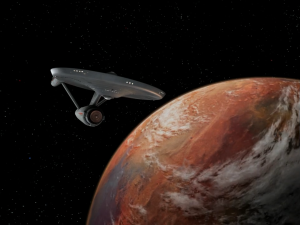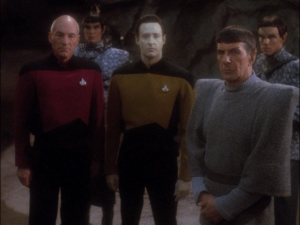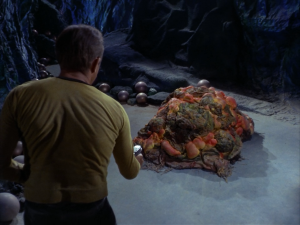Star Trek–The Humanist’s Guide to Morality
- September 8th, 2016
- Posted in Opinion/Analysis
- Write comment
 50 years ago today, Star Trek debuted on television for the first time. I know there’s no shortage of similar articles today; but whatever the motivation behind them, it all stands as a testament to the powerful impact the show has had, on both American culture in particular and the culture of the world in general. Star Trek, more than any other series, exemplifies the hopefulness and positivity in the future, to such an extent that it’s often the bar that other creators measure their work against. It was easy to be positive in the do-anything early days of modern sci-fi, but by sticking to its guns through 5 (and soon, hopefully, 6) live action series, Star Trek proved that it meant what it said.
50 years ago today, Star Trek debuted on television for the first time. I know there’s no shortage of similar articles today; but whatever the motivation behind them, it all stands as a testament to the powerful impact the show has had, on both American culture in particular and the culture of the world in general. Star Trek, more than any other series, exemplifies the hopefulness and positivity in the future, to such an extent that it’s often the bar that other creators measure their work against. It was easy to be positive in the do-anything early days of modern sci-fi, but by sticking to its guns through 5 (and soon, hopefully, 6) live action series, Star Trek proved that it meant what it said.
But why does Star Trek appeal to the people that it does, and what makes it capable of staying so popular for so long? Let’s look at this briefly, by using myself as an example. That can’t be a bad idea, right?
Star Trek to me was always TNG; while I watched it pretty frequently as a kid, I wasn’t “into it” the way you might think by looking at this site now. I never watched DS9 or Voyager when they aired, and I only watched about a season of Enterprise (which I doubt many people would blame me for). It wasn’t until I started watching it after classes in high school, about 10 years ago, that I really got interested on a serious level. That was TNG and DS9, later Voyager, and eventually I went back and watched it all, many times since. There was something to it that I really needed at the time, and characters that appealed to me.
With 9/11, Afghanistan and Iraq, and the general move towards darker storytelling that followed, it was so nice to have this show there which earnestly believed we could overcome these conflicts. I’m not a religious person, and I never have been, really, so trying to understand a lot of what followed in the wake of those events was difficult for me. Star Trek is often what helped me to deal, honestly; its use of nonhuman characters as outsiders, struggling to understand exactly what it means to be a human and live among humans gave it a unique way of approaching a lot of these problems. There’s a reason that Spock, and Data, and other characters in that vein like the Doctor and Seven of Nine, became such fan favorites–it’s because there are real people out there, typically treated as outcasts, who have a hard time understanding other human beings and why they do what they do. And for once, they could see themselves reflected in a TV character. I could. It’s one reason why I’d never begrudge anyone advocating more equal representation in media.
Spock and Data dedicated huge amount of time to understanding and coming to terms with who and what they were. Spock has emotions and problems that no other Vulcan had to deal with; he ultimately embraces his human half, and arguably wouldn’t have become as much of a legendary figure in-universe had he rejected it. A pure Vulcan could never have gone to Romulus to aid the reunification movement. Data approaches the same situation from the opposite side–he has no emotion, but everyone around him does, and it leaves him utterly baffled at times. Data is built by a human, and lives among humans, and unlike so many other robots and androids in sci-fi, he doesn’t look down on them for being emotional. He respects them, and sees value in it, and as a result people are willing to help him learn. He’s able to make friends in spite of being different, and that’s a powerful thing for someone who doesn’t feel like they fit in to see.
What’s really at the core of all this, though, and at the core of Star Trek in general, is the philosophy of Humanism. Allow me to quote Wiki’s first line there, and you’ll understand immediately why I say this:
Humanism is a philosophical and ethical stance that emphasizes the value and agency of human beings, individually and collectively, and generally prefers critical thinking and evidence (rationalism, empiricism) over acceptance of dogma or superstition.
This is what Picard is talking about when he appeals to Q; this is what drives Kirk to topple the alien worlds that have sacrificed their independence and capacity for critical thought. It’s the foundation of the Prime Directive (although not always properly interpreted) and the Borg’s complete opposition to it is what makes them such a terrifying enemy for the Federation. Gene Roddenberry built this into Star Trek from day one, and very deliberately. He wasn’t religious, and found this humanist philosophy to guide him instead. It’s what led him to push for equal representation of other ethnicities among the Enterprise crew in the 60’s, even when the studio opposed it; it led to episodes like “Devil in the Dark” where, instead of hunting down the monster killing miners, Alien-style, Kirk and Spock are able to talk to it and work out a peace that benefits both sides. Through Star Trek, whether viewers knew it or not, they were being introduced to this philosophy as well. A famous anecdote from Nichelle Nichols (Uhura) had her approaching Gene to say, “[Star Trek] is a morality play dressed up as science fiction.” to which he replied, “Shhh. (The network executives) haven’t figured it out yet.”
I wouldn’t be the first to suggest that for some, Star Trek almost occupies the same place in their life that a religion does. Trekkies might jokingly suggest “What Would Picard Do?“, but the fact of the matter is, that’s not actually a bad way to live. When fans discuss whether the new movies are “real” Star Trek, this capacity is often what they’re looking for. And this moral guidance, this philosophical core, it’s the real reason Star Trek has stood the test of time to last 50 years, and why it’ll almost certainly be around in 50 more.
So here’s to Gene, and every person who ever helped to create the shows. Every actor, extra, or writer; every set dresser and costume department member. Your input, no matter how small, is what made this series last.






well said. try to be good and try to do good = the whole point. i thank star trek (and superman) for that.
You could probably make a similar argument for Doctor Who as well. It’s likely one reason why Doctor Who suddenly became very popular in the US while Star Trek was absent. The Doctor’s belief in the value of humans, even when they seem insignificant compared to the power wielded by his own society, is very much in line with this philosophy, too.
i agree but with the caveat that since the doctor is not a human it makes a difference to the viewer. star trek is the inverse, in that the main character is human and the companions are alien who subscribe to humanities goals. (the superman version that i prefer is the one where he is raised human).
I really like how you wrote this piece. Thank you for your insight. I truly admire Captain Picard albeit he is a fictional character and strive to be a better human being.